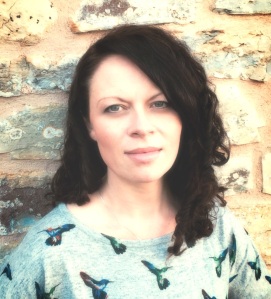The Intel: Emma Kavanagh
 We’re inviting Emma Kavanagh to come inside and take the weight of her weary plates. Emma’s just completed a punishing book tour, which has taken her down the many of the avenues and alleyways of the internet. My goodness, many a search engine has strained under the effort of keeping up with Emma’s epic month-long tour of top bloggers.
We’re inviting Emma Kavanagh to come inside and take the weight of her weary plates. Emma’s just completed a punishing book tour, which has taken her down the many of the avenues and alleyways of the internet. My goodness, many a search engine has strained under the effort of keeping up with Emma’s epic month-long tour of top bloggers.
But, of course, she’s saved the best till last—because her final stop is right here at Crime Thriller Fella. Emma’s giving us the intel on her latest novel,
Hidden, published by Century, is the story of what happens when a gunman begins stalking the wards of a hospital, and the people who are subsequently swept up in the shocking event. They say write what you know. Well, Emma spent seven years working as a police and military psychologist, training firearms officers, command staff and military personnel, throughout the UK and Europe, to deal with the most extreme situations. That’s the kind of expertise that other crime writers would, er, kill for.
Emma is a generous and engaging interviewee. She tells us about Hidden, about the psychology of firearms policing—how a split-second decision can change lives forever—and, of course, about the all-important business of writing…
Tell us about Hidden…
Hidden opens with a mass shooting, a barbaric, unthinkable act. Charlie, a reporter on the local paper, witnesses the atrocity and is left reeling. But who is the shooter? And what could possibly lead someone to do something so heinous? Hidden attempts to consider those questions by following the events that lead up to the shooting and, as the story unfolds, we start to see how even innocent actions can have repercussions.
What was the inspiration for the novel?
I am fascinated by psychology as a whole and by criminal psychology in particular. When we see an event like this on the news, it is so easy to dismiss the perpetrator as a monster or some kind of aberration. I wanted to explore that in more depth.
How did your own experience as a police and military psychologist, training firearms officers, influence the story?
This world of firearms policing was, for a long time, my world. That made the routine aspects of the characters’ roles easier for me to capture, but it also pushed me to consider how these kinds of events would have impacted on them.
 What kind of anxieties do firearms officers face on a day-to-day basis?
What kind of anxieties do firearms officers face on a day-to-day basis?
Firearms policing is often described as a ‘hurry-up-and-wait’ kind of job. Officers are trained to respond to life threatening incidents. But the reality of it is that in the UK it is extremely rare for a firearms officer to fire their weapon outside of the training environment. Whilst this is a great thing societally, it does mean that when it does happen there is a tremendous shock component for the officer to deal with.
It is also true to say that you simply never know, so every call that comes in could be ‘that call’ in which you will be forced to fire your weapon to save yourself, another officer, a member of the public. In that moment, your life will change forever. Every decision you made will be dissected, you will face a withdrawal from firearms duties, and, if you made any kind of error in judgement, you could face public opprobrium or even a criminal prosecution.
What was your journey to publication?
I wrote a book. It wasn’t very good. But it was a book. Then I wrote another book. It was… better. It got me my awesomely incredible agent, but still publication remained out of reach. Then, I wrote a third. That book was Falling and, thank goodness, it was picked up by the brilliant Jenny Geras at Arrow. Which, quite frankly, is testament to the fact that the most important quality in a writer is persistence.
What’s the hardest lesson you ever had to learn about writing?
Some people will hate what you write. And that’s okay. I mean, I don’t like everything that has ever been written and have even loathed things that people close to me have loved. It’s what keeps publishing interesting. But it did make me realise that spending time reading my reviews on sites like Amazon and Goodreads is generally a shockingly bad idea.
Who are the authors you admire, and why?
Agatha Christie, because the woman was a plotting genius! Kate Atkinson, because she is an exquisite writer and because she has so effectively moved from genre to genre. And Terry Pratchett, because his world building and humour is second to none.
Give me some advice about writing…
Write what you love. It is a tremendously tough industry and it requires a great deal of tenacity to succeed. If you are loving the day to day act of writing, it can help you survive the fight.
What’s next for you?
I am currently working on book three, another standalone psychological thriller with the working title of The Missing Hours. It is set in the world of kidnap and ransom and has necessitated some really, really interesting research! I also have book four simmering quietly in the back of my head where it has been sent until I have time to deal with it.

